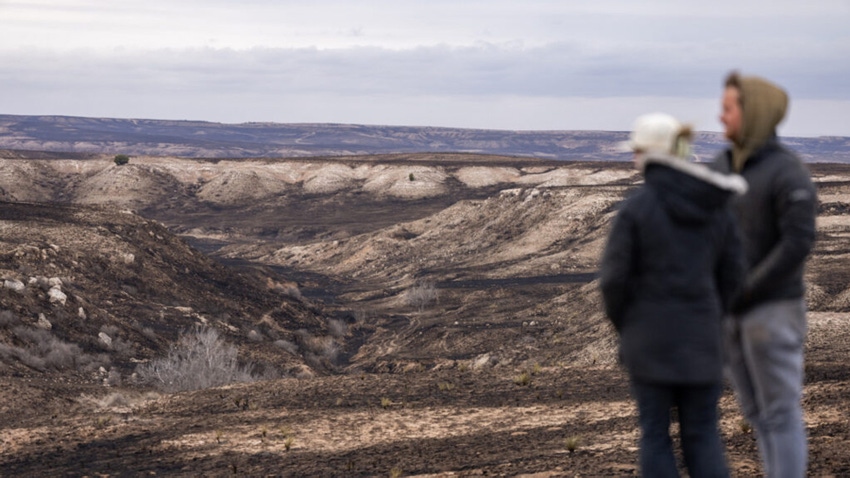
Natural disasters are traumatic events, and the wildfires that began in the Texas Panhandle on Feb. 27 are no exception.
The post-wildfire scene is likened to a warzone by Tiffany Dowell-Lashmet, a Texas A&M AgriLife Extension Service specialist in the Department of Agricultural Economics who lives in the Texas Panhandle and had to move cattle and prepare to evacuate when the fast-moving flames encroached on her home and ranching operation.
DeDe Jones, an AgriLife Extension risk management specialist working with producers in the Panhandle, said many ranchers, who were optimistic for the first time after several years of drought and high feed prices, returned to scorched land with dead livestock and in some cases, were forced to euthanize their own cattle and calves because of how badly the fires injured the animals.
Families lost their homes, including precious memories that can never be replaced.
The effects of this disaster will affect the Panhandle community for years to come.
It is important to understand that after a traumatic event, short- and long-term mental health challenges can arise.
“We must know what signs and symptoms to look for to decide whether we, or someone else around us, might benefit from professional help,” advised Miquela Smith, an AgriLife Extension health program specialist for the agency’s Disaster Assessment and Recovery, DAR, Unit, based in Lubbock. She said ongoing support for individuals who have survived a traumatic event is crucial.
“In the short term, disasters can bring on feelings of restlessness, shock, fear, disbelief, anger and sadness. These are all normal responses to an abnormal situation,” Smith said. “In the long term, these symptoms can worsen and affect our ability to work, maintain relationships and lead fulfilling lives. When symptoms last for more than a few weeks, that’s an indicator that we might need to seek out a professional to help us recover from the traumatic event.”
Reaching out and taking care
The DAR program has recognized that along with the physical needs of recovering family homes, agricultural infrastructure, businesses and livestock after a natural disaster, there is also a need to help those going through emotional distress with mental health needs.
Monty Dozier, Ph.D., DAR program director, has emphasized the importance of training to support the mental health of community members following a disaster.
“DAR agents encounter individuals after a disaster who are experiencing mental distress and could be at risk for developing a more serious mental health condition. DAR agents also come into contact with those individuals during the long-term recovery process,” Dozier said.
“People impacted by this wildfire are focused on their families, their animals and their operations,” he said. “We want to make sure they know we are here to help them manage the stress, anxiety and any feelings of helplessness or hopelessness. They just need to know they are not alone and that we’re here to support them through this crisis.”
AgriLife Extension’s Mental Health First Aid, MHFA, is an evidence-based program that began in Australia and is now taught all over the world.
Through the program, agents are trained to recognize signs and symptoms and then utilize an action plan to render first-aid level care to someone in distress or crisis. Smith said part of a mental health first aider’s role is to be a non-judgmental listening ear and a source of hope; depending on the situation, they may also encourage a person to seek appropriate professional help.
This valuable program is also offered to communities, she said.
An important aspect of offering ongoing support after a traumatic event is helping individuals regain a sense of control over their lives and encouraging healthy coping strategies, Smith said. MHFA also teaches participants how to assess when things are not getting better, and the person may benefit from professional care.
“For example, we expect that people may not seem like themselves for a few weeks after a disaster, but if a month goes by and feelings of sadness, hopelessness or numbness persist, professional help might be beneficial,” she said.
Seeking certified agents and training
There are 45-50 AgriLife Extension county agents and program specialists certified as Mental Health First Aid Instructors. These agents and specialists are certified to train people as Mental Health First Aiders who would like to serve their communities.
If you want to learn more about or go through the training to provide this service, contact your local DAR or AgriLife Extension family community health agent.
Smith said training is offered virtually, in-person or hybrid, by DAR agents or AgriLife Extension family community health agents.
“If there isn’t a MHFA instructor located directly in your county, we can travel to train others,” Smith said.
“We equip our agents to respond to natural disasters with animal supply points and paperwork, but we also recognized the importance of having agents trained to understand the mental health needs that arise after experiencing a traumatic event,” she said.
“This is an important part of the recovery process after disasters like these wildfires. Texans always respond to disasters like good neighbors, and we want our community members to feel just as confident reaching out to someone experiencing a mental health challenge as they would someone with a broken ankle. If your neighbor broke their ankle, you’d check in on them often, offer them a ride to the doctor, and encourage them to get x-rays ASAP. Just like with a physical injury, recovery from a mental health challenge is possible with the proper intervention and care.”
About the Author(s)
You May Also Like




